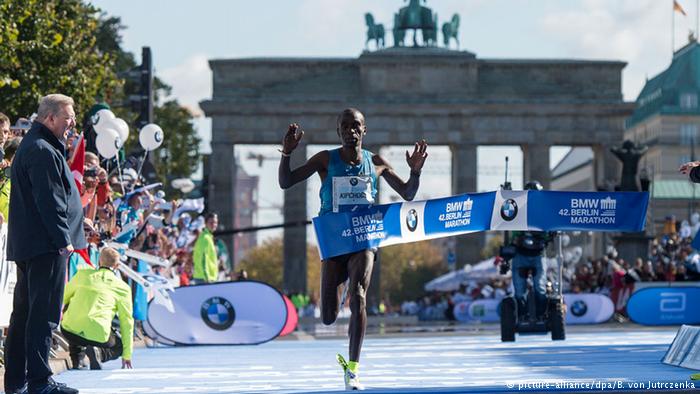By the time he reached the finish, blistered and bloodied, there was little doubt that Eliud Kipchoge had established himself as the world’s best marathoner.
As was the 2:19:25 that Gladys Cherono ran to win the women’s race, Kipchoge’s time was the fastest in the world this year. But it was the circumstances under which Kipchoge dispatched the field that established him as the most formidable marathoner in the world.
Kipchoge ran the vast majority of the race with his insoles hanging loose from his shoes, a footwear malfunction that caused considerable pain and distraction through the latter part of the race.
“It was not easy,” he said. “There are blisters on the left foot and my big toe is cut, with lots of blood.”
When the field set off in cool and sunny conditions in the city’s Tiergarten, hopes were high that Dennis Kimetto’s world record of 2:02:57—set last year in Berlin—would be threatened, with Kipchoge, the London winner in April, seen as the one most likely to do it.
But in the first mile, Kipchoge’s left insole began to come loose and slide out of his shoe. By the time he reached 10K mark with the leaders in 29:19, five seconds ahead of world record schedule, his right insole was doing the same.
At the pace they were moving at, Kipchoge didn’t dare risk stopping, not only to avoid losing ground but also out of fear of making the situation worse. “I had pain in my foot, but what could I do?” he said. “I had to finish the race.”
When the lead group reached halfway in 61:53, Kipchoge ran directly behind the pacemakers, but he had others for company: fellow Kenyans Emmanuel Mutai, Geoffrey Mutai, and Eliud Kiptanui along with Ethiopians Feyisa Lilesa and Tamirat Tola.
By 30K, Boston and New York City course record holder Geoffrey Mutai and Tola had been dropped, with Emmanuel Mutai and Kipchoge pushing the pace at the front. Right around the 20-mile mark, Kipchoge made the first significant move of the race.
With his insoles still flapping to the side, Kipchoge moved to the front, opening up his powerful stride and moving clear. He covered the five kilometers between 30K and 35K in 14:23, by far the fastest section of the race. When he ran through the Brandenburg Gate with a quarter mile to go, his rivals were out of sight.
When he crossed the finish line, arms outstretched, in 2:04:00, Kipchoge brought to five his number of marathon wins out of six attempts at the distance. His only defeat was in Berlin two years ago, when he was second behind Wilson Kipsang’s then-world record of 2:03:23.
The question on everyone’s mind afterwards was what went wrong with his shoes, and how much faster Kipchoge thought he could have gone without the malfunction.
“The glue on the insole did not stick,” he said. “It is a good shoe and I have tested that same shoe in training, but that is sport. I have to accept it. I think I would have run faster than that but I don’t know the time.”
Kipchoge plans to take three weeks off to recover before targeting a spring marathon, but he is mostly looking ahead to the 2016 Olympic Marathon in Rio de Janeiro. “I’m not going to celebrate as I have been running for a long time,” the 2003 world 5,000-meter champion said. “I will go back and plan for my next marathon, but my mind is in Rio. That’s my main aim.”
Behind Kipchoge, who coasted across the line looking just as fresh as he was two hours earlier, his beaten rivals reached the finish in the manner of punch-drunk boxers. First in was Kiptanui, who had a breakthrough run to finish second in a personal best of 2:05:21.
“I am impressed to be runner-up to Kipchoge,” said Kiptanui, aware that he was up against an unbeatable force today.
Others, such as fourth-placed Emmanuel Mutai, the second fastest man ever, dropped to his knees after the finish, vomiting. Putting a hand on Mutai’s shoulder as he walked past, making sure he was okay, was training partner Kipchoge, who showed few signs of fatigue from his effort.
Race director Mark Milde, meanwhile, was busy talking to Kipchoge’s agent, seeing if he could secure Kipchoge’s infamous insoles for a permanent place in the marathon’s museum.

